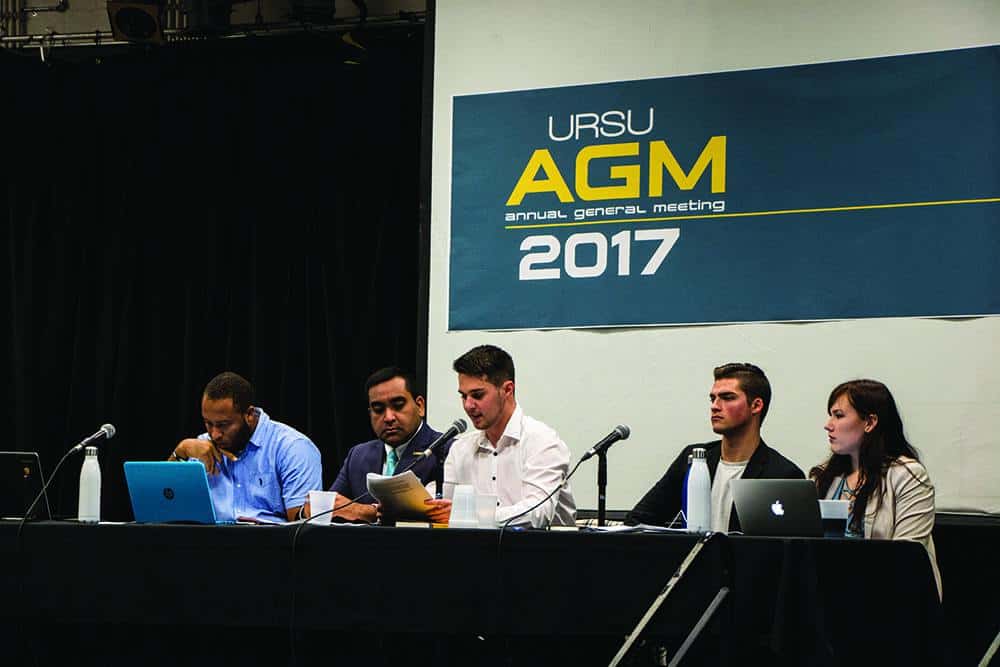URSU annual general meeting asks about CFS

author: taylor balfour | news writer

to leave, or not to leave? That is the question credit jaecy bells
The debate was intense: Is it worth staying or leaving?
The University of Regina Students’ Union (URSU) held their annual general meeting this past week to detail upcoming changes, as well as cover progress made since last year, and hear from students about potential changes.
Many changes were announced like how URSU’s revenue increased by 22 per cent this year, all of which will be going back to students in various ways.
URSU’s first question was regarding new business surrounding the updating process of their constitution. The changes were to focus around adding language to be more inclusive and accepting to students with disabilities and other marginalized students.
The changes also included information detailing how Campus For All students can apply to vote in URSU elections.
Another major motion made was that no one in URSU may remain in the same elected position for more than two terms. However, the debate surrounding such a move was presented.
Those against the motion argued that many URSU jobs require learning as you work, and that the first term after one has been elected is one of getting accustomed to the position.
On the other side, however, those in favour argued that turnover is healthy for any organization on campus. Students voiced that those elected carry out their terms with whichever students are currently enrolled in school alongside them, so enabling other students the chance at the position is important.
They also argued that the longer one person holds their position, the less likely it is for turnover to happen. Despite the back and forth, the motion carried.
Toward the end of the meeting, many members in charge of their respective field in URSU stepped forward to provide their annual reports.
The Vice President of External Affairs, Haris Khan, reported that URSU’s Welcome Week had extremely good feedback, and that this year URSU worked with federated colleges to put on the event.
They reported that a new clothing drive was underway for December, and that URSU’s Mental Health Week is scheduled for February, 2018.
The Vice President of Operations and Finance, Derrick Gagnon, reported that only 34 per cent of students opted out of URSU’s Health and Dental Plans, meaning a majority of students remained enrolled.
However, the greatest amount of interest surrounding the meeting stemmed from a proposition made early on.
The proposition posed a referendum to take place to determine whether or not URSU would like to remain a part of the Canadian Federation of Students (CFS).
A motion was suggested during the meeting asking if U of R students would be interested in having a referendum to debate leaving the CFS. An amendment was made suggesting that URSU actively campaign to leave the CFS considering that the CFS usually campaigns for students to vote to stay.
The amendment suggested that URSU meet the level of campaigning as the CFS, capping the amount at one hundred thousand dollars.
The reasoning behind the suggested move was that the U of R doesn’t receive the same support it once had, and that the money being used to pay the membership fee to remain a part of the CFS could be used elsewhere.
The current URSU President, Jermain McKenzie, argued that CFS was important for the university, and many on his side claimed that the CFS helped with funding programs at the First Nations University of Canada.
“I believe in the importance of having a national student movement,” McKenzie said in support of remaining with the CFS.
On the CFS website, they claim to be “the largest national student association in Canada”.
They also report that “the Federation unites more than 650,000 college, undergraduate, graduate, part-time and international students from coast to coast.”
“All major decisions are made at twice-yearly national and provincial general meetings,” their website explains.
“Each member students’ union has an equal say in setting the policies, direction and priorities of the Federation with the principle of ‘one member, one vote’. Every motion submitted to a general meeting gets debated by all member students’ unions in attendance at plenary.”
McKenzie argued during the event that the CFS was involved in the National Day of Action taking place in September, a day in which “marks the 10th anniversary of the UN Declaration on the Rights of Indigenous Peoples (UNDRIP) a universal legal framework, which acknowledges the inherent collective human rights of the approximately 370 million Indigenous Peoples worldwide” the UNsettling Canada 150 website claims.
McKenzie said that the CFS campaigns for lower tuition and helps support marginalized students and, therefore, the CFS does have involvement with the U of R’s campus.
However, it was countered that the CFS fails to have a Saskatchewan-based researcher, and so Saskatchewan’s lack of presence in the CFS is also data based. McKenzie argued that all it would take for that to change would be to request it.
The CFS’s website also claims that they offer “a number of programs and services in order to offset the high cost of education. Federation services are designed to help both individual student members and students’ unions save money.”
McKenzie’s hope is that the campus will vote to remain with the CFS, and that their relationship can improve through conversation opposed to voting to exit.
The U of S left the CFS around 2007. Shortly after them, in 2008, the University of Calgary reportedly wished to exit thanks to “a petition with over 800 graduate student signatures from the University of Calgary’s Graduate Students’ Association.”
Reportedly, a similar story took place with Concordia University located in Montreal, in which students signed a petition asking for a referendum to leave also back in 2009. Dawson College, also based in Montreal, reportedly did the same.
The University of Regina is clearly not the first, nor the last, university to debate leaving the CFS.









